英语必修二Module 4 Fine Arts – Western, Chinese and Pop Arts Listening and vocabulary课件(共26张PPT)
文档属性
| 名称 | 英语必修二Module 4 Fine Arts – Western, Chinese and Pop Arts Listening and vocabulary课件(共26张PPT) | 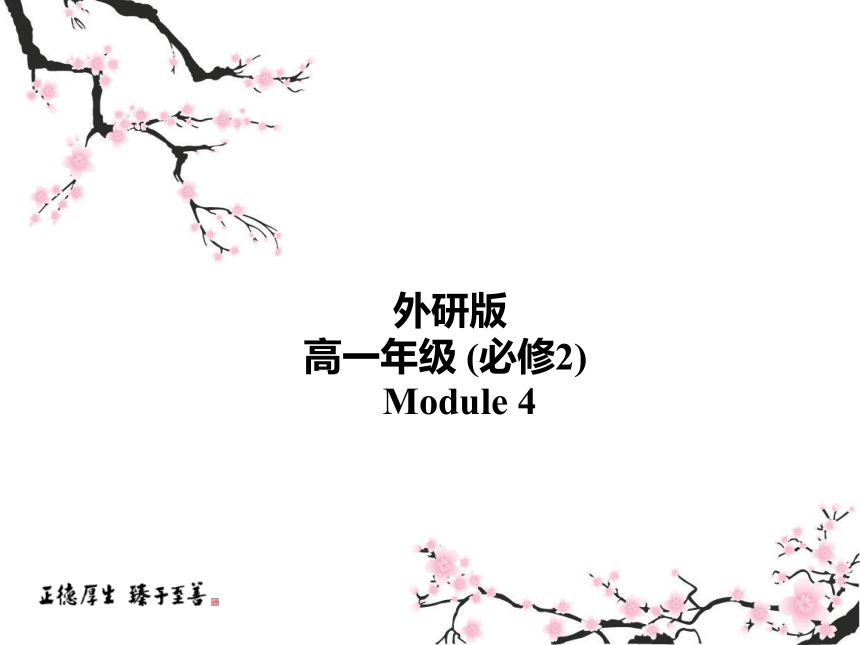 | |
| 格式 | zip | ||
| 文件大小 | 697.1KB | ||
| 资源类型 | 教案 | ||
| 版本资源 | 外研版 | ||
| 科目 | 英语 | ||
| 更新时间 | 2018-11-24 17:51:13 | ||
图片预览

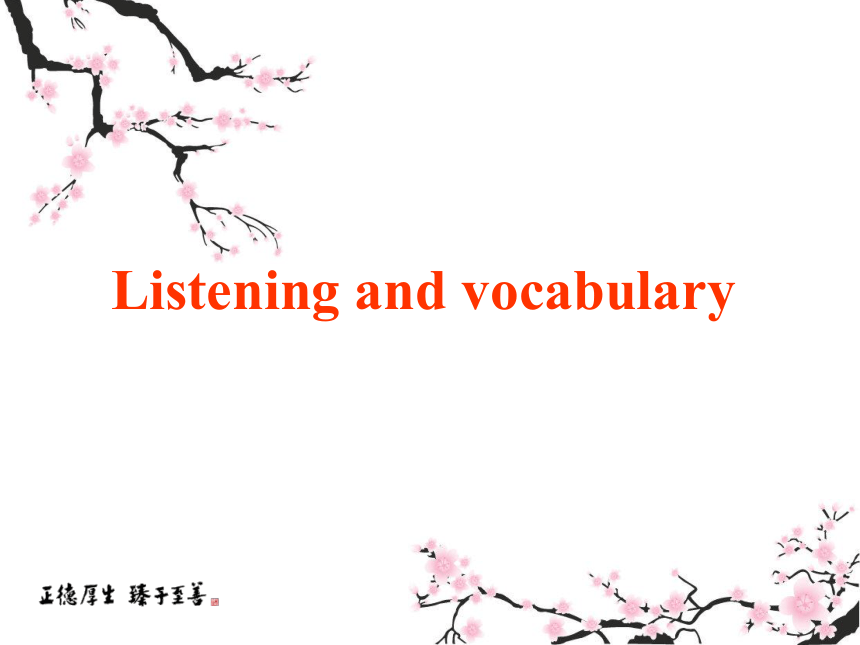
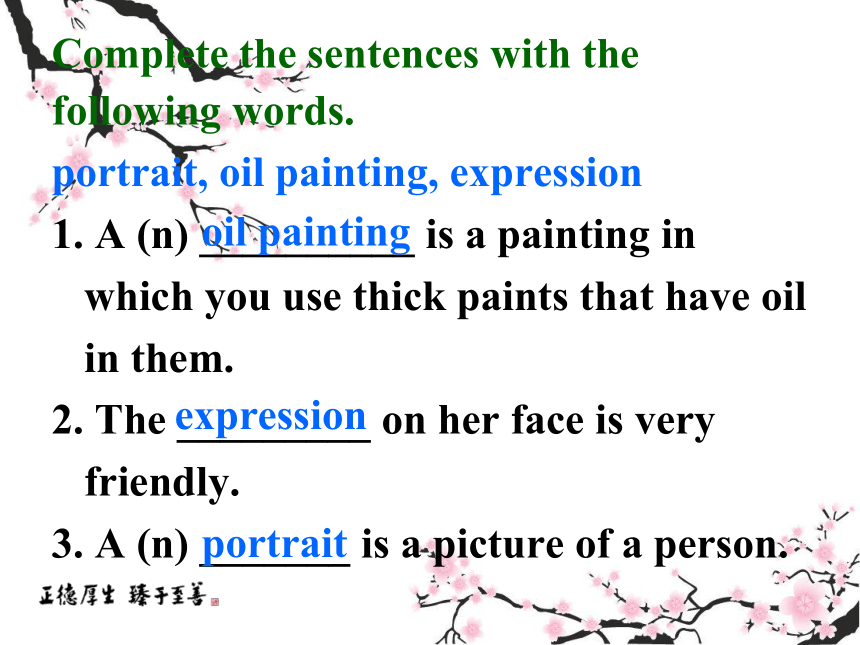
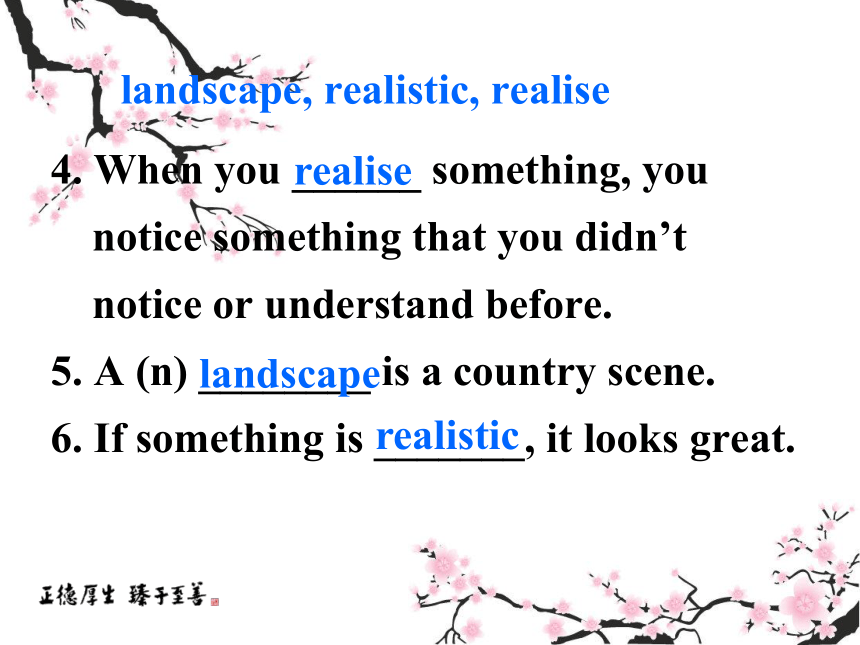

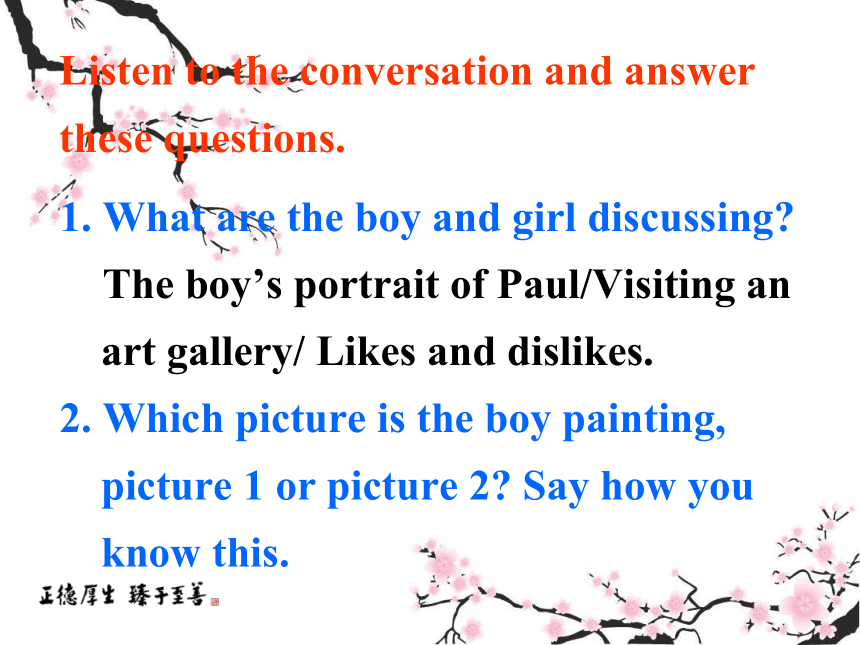
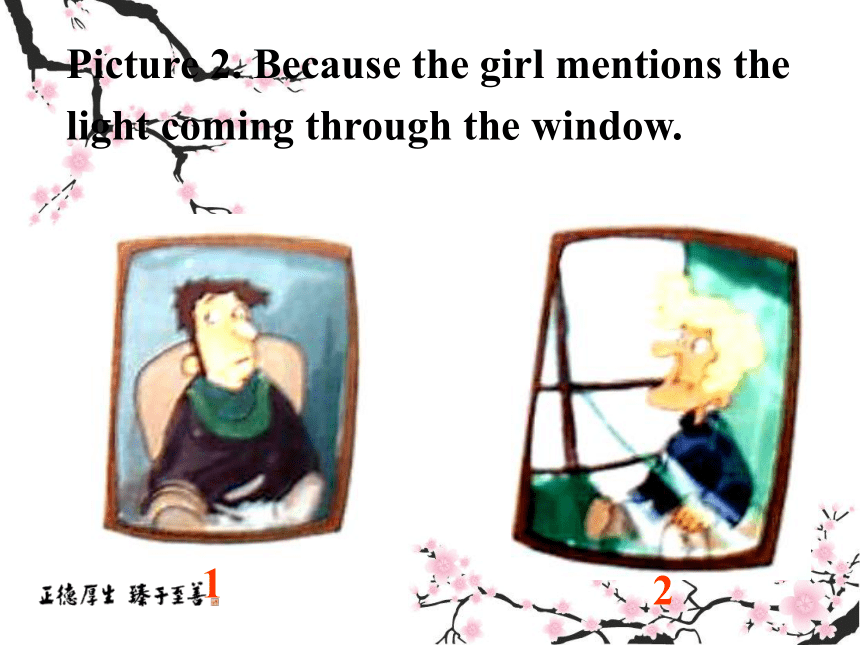
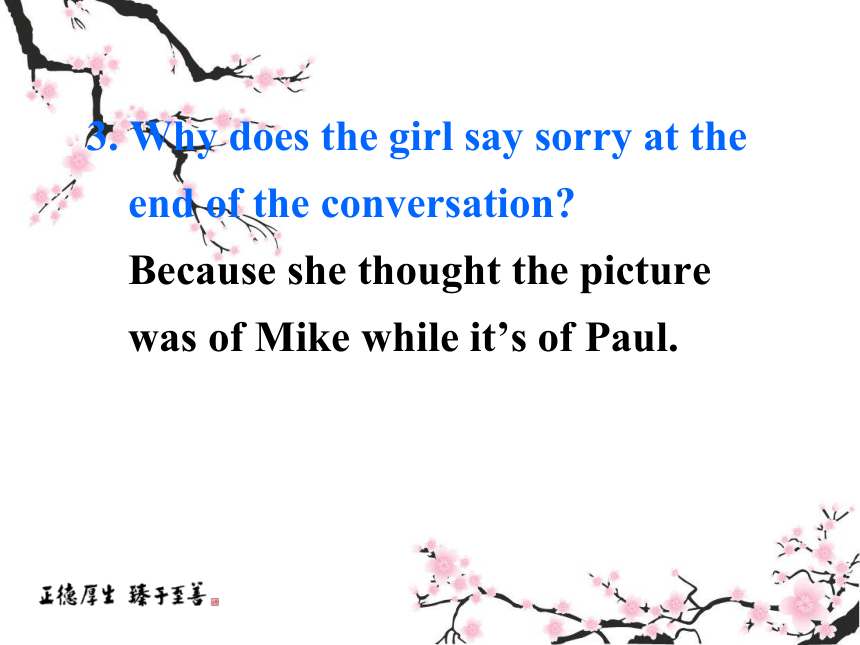
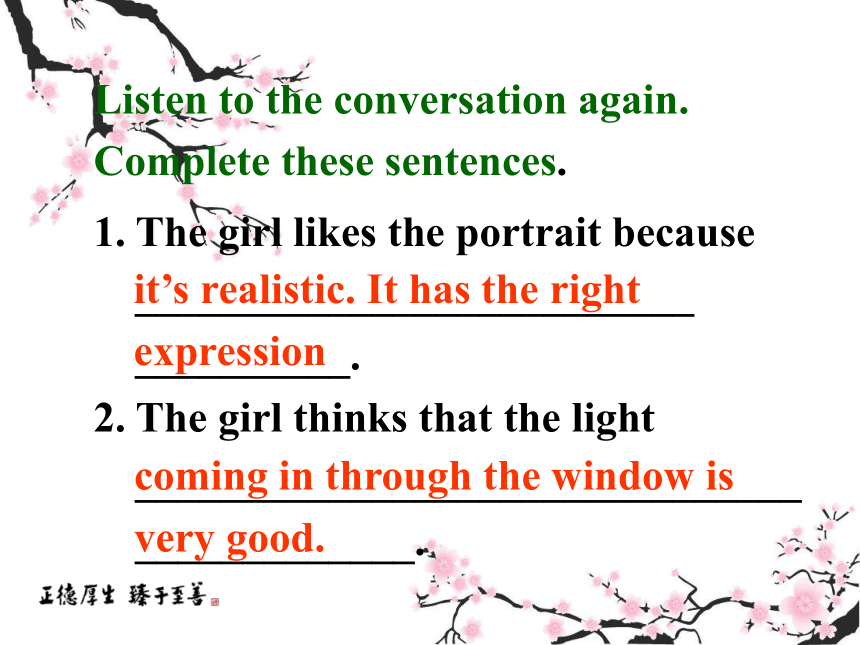
文档简介
课件26张PPT。外研版
高一年级 (必修2)
Module 4Listening and vocabularyComplete the sentences with the following words.portrait, oil painting, expression
1. A (n) __________ is a painting in which you use thick paints that have oil in them.
2. The _________ on her face is very friendly.
3. A (n) _______ is a picture of a person. oil paintingexpressionportraitlandscape, realistic, realise4. When you ______ something, you notice something that you didn’t notice or understand before.
5. A (n) ________ is a country scene.
6. If something is _______, it looks great. realise landscape realisticcompliment, exhibition, watercolour7. A (n) __________ painting uses a type of paint that is mixed with water.
8. A (n) _________ is a public show where people can go and see paintings or photographs.
9. A (n) __________ is a remark that shows you admire someone or something watercolour exhibition complimentListen to the conversation and answer these questions.1. What are the boy and girl discussing?
The boy’s portrait of Paul/Visiting an art gallery/ Likes and dislikes.
2. Which picture is the boy painting, picture 1 or picture 2? Say how you know this. 1 2Picture 2. Because the girl mentions the light coming through the window.3. Why does the girl say sorry at the end of the conversation? Because she thought the picture was of Mike while it’s of Paul.
Listen to the conversation again. Complete these sentences.1. The girl likes the portrait because __________________________ __________.
2. The girl thinks that the light ____________________________________________.it’s realistic. It has the right expressioncoming in through the window is very good.3. The boy is really fond of _______.
4. The girl is better at ________ than
________.
5. The boy suggests ___________________.
6. The boy likes __________ more than ___________.
7. The girl has not recognised _______________________________.paintingdrawingpaintinggoing to an art galleryoil paintingswatercoloursthat it is a picture of Paul, not MikeTapescriptGirl: Hey, that’s a good portrait. It’s so realistic. You’ve really got the expression right – the look in the eyes.
Boy: Yes, I’m pleased with it. What do you make of the mouth? Do you think I need to do more work on it?Girl: No, don’t change a thing. It’s brilliant. And the light coming in through the window is really good. You’re a good painter, you know.
Boy: Thanks for the compliment! I’m really fond of painting. But learning to paint well takes a long time. How about you, are you interested in it? Girl: Yes, but I’m not half as good as you. Painting is difficult for me. I couldn’t possibly paint a portrait as good as this. I think drawing’s a lot easier. I do quite a lot of drawing.
Boy: So do I. I always learn a lot when I draw. It teaches you to observe things carefully. Do you go to art galleries?Girl: No, I don’t. But I should, I know. I really do love art.
Boy: Well, how about going to an art gallery next weekend? I’m sure we can find something interesting.
Girl: I’d love to.
Boy: There’s a pop art exhibition on at the moment.Girl: Um, I don’t like pop art.
Boy: Nor do I, really. I know, there’s an exhibition of water colours on at the same gallery.
Girl: Oh, that sounds interesting. I love water colours.
Boy: Do you? I prefer oil paintings, myself. But I’d still like to go.Girl: Let’s do that then…And I do think your picture of Mike is wonderful.
Boy: Mike? It’s not a picture of Mike! It’s a picture of Paul!
Girl: Paul? It’s a picture of Paul? Oh! I didn’t realise that. Sorry!疑难句分析1. You’ve really got the expression right---the look in the eyes. 你真的抓住了表情---(我是说)眼神。
expression在本句中表示“表情,脸色”, look则表示“眼神, 神情”。2. What do you make of the mouth?
你认为嘴部(画得)怎么样?
What do you make of sth?该句式常用
来征求别人的意见或看法。相当于
What do you think of sth?/How do you
like sth? 3. And the light coming in through the window is really good. 而且从窗户射进来的光线真的(表现的)很好。本句中coming in through the window为
现在分词作定语修饰the light。4. It teaches you to observe things very
carefully.
它教你仔细地观察事物。
observe 的用法
1) vt. & vi.看或注意到(不用于进行时)① Scientists have observed a drop in ozone levels over the Antarctic. 科学家们已观察到南极上空臭氧层的减少。
② It was observed that 40 percent of patients had high blood pressure. 据观察有百分之四十的病人有高血压。③ They observed him driving at 90
miles per hour.
他们看到他以每小时90英里的速度
驾驶。2) vt. & vi.仔细观察
① The police have been observing his movements. 警察一直在关注着他的动向。
② Observe how the people in the group interact. 注意观察组里的人们是如何互动的。
③ One performs the experiment, while others observe. 一个人做实验,其他人观看。3) vt. 说或写
① “Mary looks ill”, she observed. “玛丽好像病了”,她说。
② He observed that human falls into two classes. 他认为人分为两类。5. There’s a pop art exhibition on at the moment. 现在一个流行艺术展正在进行。
on在本句中表示“正在进行”的意思。
6. Oh, I didn’t realise that.
哦, 我没有意识到(那是Paul的画像)。
注意:本句中的没有意识到是在男孩告诉她之前, 因而表述的是过去的事, 应用过去时。realise 1) 知道; (突然)理解或意识到
① I suddenly realised that he was lying.我突然意识到他到撒谎。
② It was only later that I realised my mistake. 直到后来我才意识到我的错误。2) 使(理想等) 成为现实
① She never realized her dream of winning an Olympic gold medal. 她从未实现拿奥林匹克金牌的梦想。
② He works very hard to realise his ambition. 为了实现他的宏伟目标, 他每天努力工作。
高一年级 (必修2)
Module 4Listening and vocabularyComplete the sentences with the following words.portrait, oil painting, expression
1. A (n) __________ is a painting in which you use thick paints that have oil in them.
2. The _________ on her face is very friendly.
3. A (n) _______ is a picture of a person. oil paintingexpressionportraitlandscape, realistic, realise4. When you ______ something, you notice something that you didn’t notice or understand before.
5. A (n) ________ is a country scene.
6. If something is _______, it looks great. realise landscape realisticcompliment, exhibition, watercolour7. A (n) __________ painting uses a type of paint that is mixed with water.
8. A (n) _________ is a public show where people can go and see paintings or photographs.
9. A (n) __________ is a remark that shows you admire someone or something watercolour exhibition complimentListen to the conversation and answer these questions.1. What are the boy and girl discussing?
The boy’s portrait of Paul/Visiting an art gallery/ Likes and dislikes.
2. Which picture is the boy painting, picture 1 or picture 2? Say how you know this. 1 2Picture 2. Because the girl mentions the light coming through the window.3. Why does the girl say sorry at the end of the conversation? Because she thought the picture was of Mike while it’s of Paul.
Listen to the conversation again. Complete these sentences.1. The girl likes the portrait because __________________________ __________.
2. The girl thinks that the light ____________________________________________.it’s realistic. It has the right expressioncoming in through the window is very good.3. The boy is really fond of _______.
4. The girl is better at ________ than
________.
5. The boy suggests ___________________.
6. The boy likes __________ more than ___________.
7. The girl has not recognised _______________________________.paintingdrawingpaintinggoing to an art galleryoil paintingswatercoloursthat it is a picture of Paul, not MikeTapescriptGirl: Hey, that’s a good portrait. It’s so realistic. You’ve really got the expression right – the look in the eyes.
Boy: Yes, I’m pleased with it. What do you make of the mouth? Do you think I need to do more work on it?Girl: No, don’t change a thing. It’s brilliant. And the light coming in through the window is really good. You’re a good painter, you know.
Boy: Thanks for the compliment! I’m really fond of painting. But learning to paint well takes a long time. How about you, are you interested in it? Girl: Yes, but I’m not half as good as you. Painting is difficult for me. I couldn’t possibly paint a portrait as good as this. I think drawing’s a lot easier. I do quite a lot of drawing.
Boy: So do I. I always learn a lot when I draw. It teaches you to observe things carefully. Do you go to art galleries?Girl: No, I don’t. But I should, I know. I really do love art.
Boy: Well, how about going to an art gallery next weekend? I’m sure we can find something interesting.
Girl: I’d love to.
Boy: There’s a pop art exhibition on at the moment.Girl: Um, I don’t like pop art.
Boy: Nor do I, really. I know, there’s an exhibition of water colours on at the same gallery.
Girl: Oh, that sounds interesting. I love water colours.
Boy: Do you? I prefer oil paintings, myself. But I’d still like to go.Girl: Let’s do that then…And I do think your picture of Mike is wonderful.
Boy: Mike? It’s not a picture of Mike! It’s a picture of Paul!
Girl: Paul? It’s a picture of Paul? Oh! I didn’t realise that. Sorry!疑难句分析1. You’ve really got the expression right---the look in the eyes. 你真的抓住了表情---(我是说)眼神。
expression在本句中表示“表情,脸色”, look则表示“眼神, 神情”。2. What do you make of the mouth?
你认为嘴部(画得)怎么样?
What do you make of sth?该句式常用
来征求别人的意见或看法。相当于
What do you think of sth?/How do you
like sth? 3. And the light coming in through the window is really good. 而且从窗户射进来的光线真的(表现的)很好。本句中coming in through the window为
现在分词作定语修饰the light。4. It teaches you to observe things very
carefully.
它教你仔细地观察事物。
observe 的用法
1) vt. & vi.看或注意到(不用于进行时)① Scientists have observed a drop in ozone levels over the Antarctic. 科学家们已观察到南极上空臭氧层的减少。
② It was observed that 40 percent of patients had high blood pressure. 据观察有百分之四十的病人有高血压。③ They observed him driving at 90
miles per hour.
他们看到他以每小时90英里的速度
驾驶。2) vt. & vi.仔细观察
① The police have been observing his movements. 警察一直在关注着他的动向。
② Observe how the people in the group interact. 注意观察组里的人们是如何互动的。
③ One performs the experiment, while others observe. 一个人做实验,其他人观看。3) vt. 说或写
① “Mary looks ill”, she observed. “玛丽好像病了”,她说。
② He observed that human falls into two classes. 他认为人分为两类。5. There’s a pop art exhibition on at the moment. 现在一个流行艺术展正在进行。
on在本句中表示“正在进行”的意思。
6. Oh, I didn’t realise that.
哦, 我没有意识到(那是Paul的画像)。
注意:本句中的没有意识到是在男孩告诉她之前, 因而表述的是过去的事, 应用过去时。realise 1) 知道; (突然)理解或意识到
① I suddenly realised that he was lying.我突然意识到他到撒谎。
② It was only later that I realised my mistake. 直到后来我才意识到我的错误。2) 使(理想等) 成为现实
① She never realized her dream of winning an Olympic gold medal. 她从未实现拿奥林匹克金牌的梦想。
② He works very hard to realise his ambition. 为了实现他的宏伟目标, 他每天努力工作。
